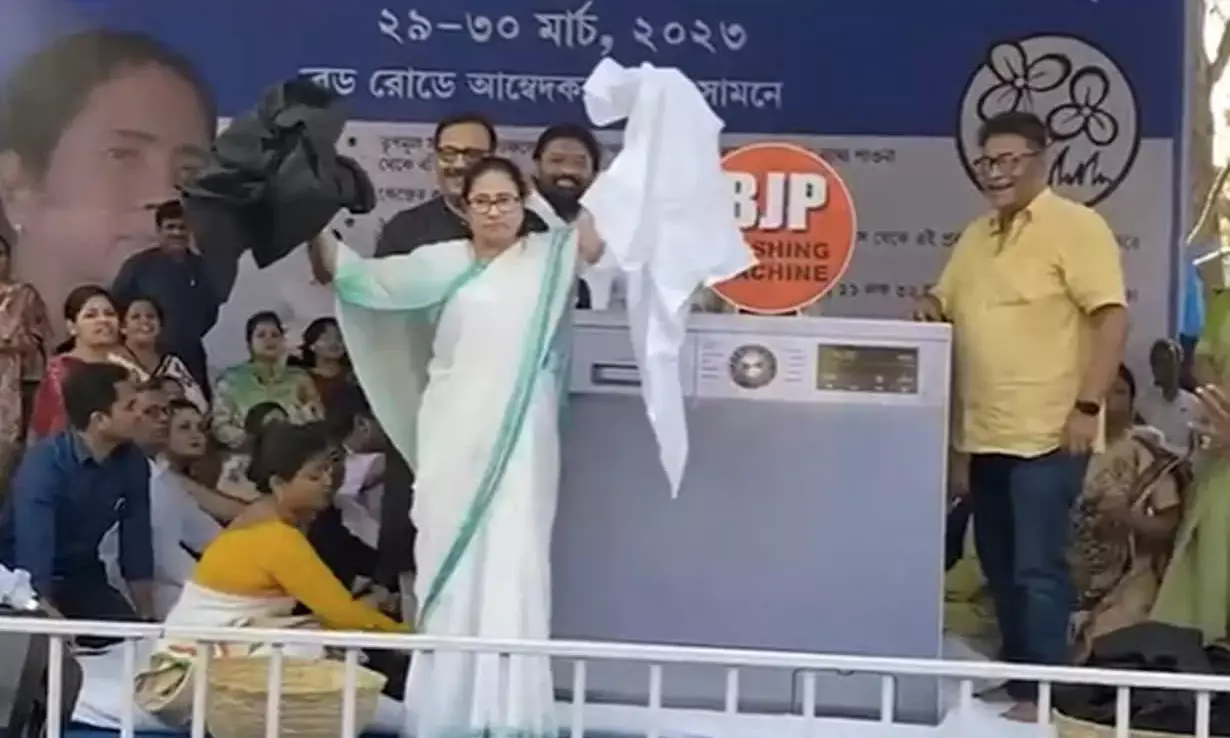19 Opposition Parties Come Together In The Search For Unity
A lot more needs to be done

The disqualification of Rahul Gandhi from Parliament seems to have infused new life in the Opposition, and a unity not seen for a long while. Two arch opponents of the Congress party, with no love lost on either side, have come out in support of Rahul Gandhi and questioned the court ruling on defamation and the subsequent disqualification.
Trinamool Congress chief and West Bengal Chief Minister Mamata Banerjee extended support, and sharpened her attack on the BJP with her usual flair for drama. A washing machine was brought on stage amidst chants of ‘washing machine - Bhajapa” and a jingle as well, with the state CM throwing black sheets into it and pulling out white sheets. There was a new spring in her step as she went back, after a hiatus, into anti-BJP mode, even singing along with the others as she pulled out the clothes and held them aloft.
Aam Aadmi Party leader and Delhi Chief Minister Arvind Kejriwal who also supported Rahul Gandhi during this crisis, came out with a second speech in the Assembly questioning Prime Minister Narendra Modi’s statement that all the corrupt had come on one stage. He said that he agreed with the PM but with one qualification, it was not that all the corrupt had come on one stage but were all in one party, the BJP. Kejriwal said that legislators and others who were corrupt could not sustain action by the Enforcement Directorate, Income Tax and when given the choice of jail or joining the BJP, opted for the latter. Referring to his deputy Manish Sisodia, Kejriwal said he was clean so he opted for jail knowing that he would be released sooner than later as the charges against him would not stand judicial scrutiny.
Samajwadi Party leader Akhilesh Yadav, who had also appeared to move away from the Congress party in recent months, extended support and said that the time had come for the national party to bring the regional parties to the forefront, and support them in their pursuit to defeat the BJP. He accorded the central role to the Congress party with, “All the parties fighting against the BJP across the country should come together, and the Congress party should decide its role at the national level. It should support other political parties fighting strongly against the BJP in their regions…”
Nineteen political parties have come together in support against the BJP. Uddhav Thackeray and his party had some reservations about Rahul Gandhi’s remark ,”I am not Savarkar, I am Gandhi, and Gandhi’s do not apologise” but has relented and is part of the emerging unity. The Opposition parties have faced desertions, cases, harassment with several political leaders now also in jail. There is a growing realisation that without unity to face the 2024 general elections they can all disintegrate, and are no match singly for the BJP’s determined attack.
However, despite all the seemingly positive energy little can be done without one, a basic common agenda that allows the opposition parties across the country to at least raise some similar national demands with one voice; two, strong organisation at local levels to bring the voters out, get the vote cast, and protect the booths and the machines after; three, and perhaps the most important of all to allow the main party in every state to have a larger rather than smaller say in the distribution of seats. The opposition parties seeking to work together will need to hold several meetings and joint action to emerge fighting fit, or at least thereabouts, before the general elections. Right now they are all separate entities, some with a history of working together but most with a history of coming apart.
The BJP on the other hand is a cohesive, decisive force with the RSS and front organisation providing it a strong infrastructure to function within. It cannot be challenged effectively by a group of political parties without preparation and cooperation. A plus point at the moment is the willingness amongst the other 18 parties to accept the Congress in the lead role, and that provides the foundation really for the building blocks that need to follow. Till now the leaders above were not willing to accept this, but recent weeks and events have clearly brought about a change in perception. Now comes the difficult part — of getting along and working together.



